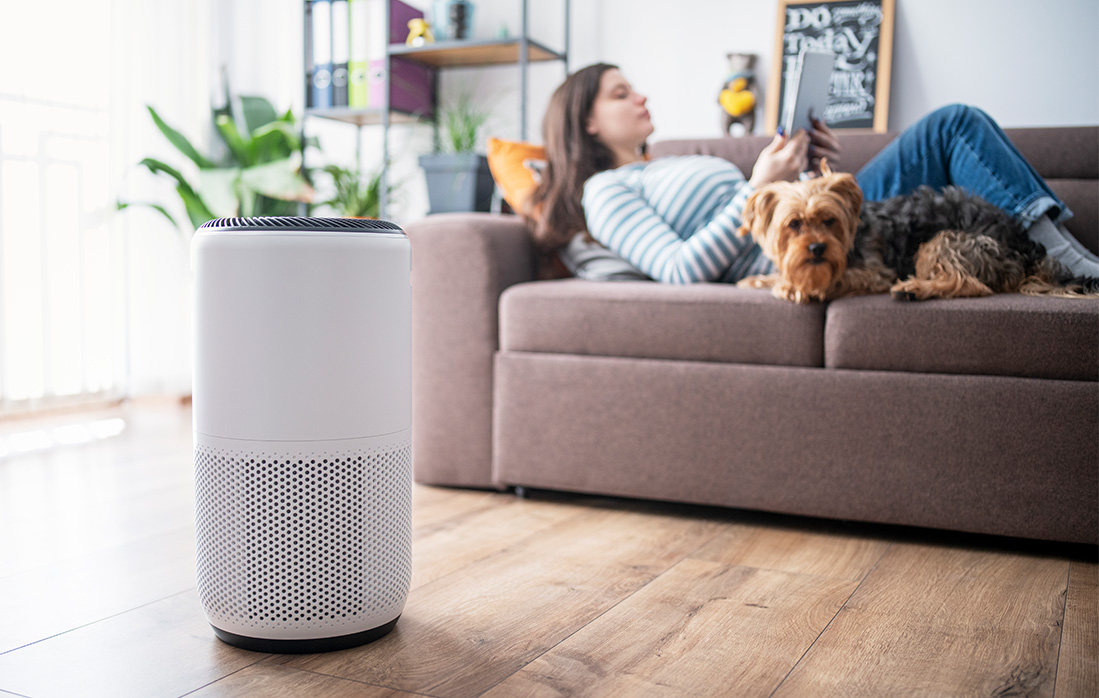Getting high-quality, healthy sleep should be a priority for everyone. There are lots of ways to make a sleep environment conducive to great sleep, including using an air purifier in your bedroom. These devices remove allergens and contaminants from the air, leaving the air you breathe as clean as possible.
But are there downsides to using an air purifier while you sleep? Find out about the pros and cons, and what you can expect from using an air purifier during the night.
What Is an Air Purifier?
An air purifier is also known as an air cleaner and provides better air quality for indoor environments by removing contaminants. This leaves you with cleaner air to breathe all night long.
Types of Air Purifiers
Air purifiers come in a few different forms and work in a couple of different ways. Below you’ll find the most common types of air purifiers.
RELATED: Best Air Purifiers
Ultraviolet (UV) Air Purifiers
These air purifiers use shortwave UV-C light to make microorganisms like viruses, mold, bacteria, and airborne pathogens inactive.
HEPA Air Purifiers
A HEPA air purifier, or “high-efficiency particulate air filter” is said to be able to remove 99.97% of pollen, dust, bacteria, mold, and airborne particles. It can even remove particles that are as small as 0.3 microns (µm).
Ionic Air Purifiers
These air purifiers work by unleashing negatively charged ions into the air. This causes other particles in the air to become charged, allowing them to stick to surfaces in the room such as the floor and walls.
Activated Carbon Air Purifiers
These air purifiers trap odors by absorbing them and allowing them to become trapped on the surface of the carbon rather than soaking into the air.

How Does an Air Purifier Work?
Each of the air purifiers mentioned above operates in a slightly different way.
- Ultraviolet (UV) Air Purifiers – Uses shortwave UV-C light to inactivate microorganisms and airborne pathogens.
- HEPA Air Purifiers – Uses an air filter to trap airborne particles.
- Ionic Air Purifiers – Charges particles in the air so that they stick to surfaces.
- Activated Carbon Air Purifiers – Absorbs odors from the air.
How to Use an Air Purifier
In order to ensure that you are making the most of your air purifier, you need to be using it correctly.
How Long to Run an Air Purifier
You can leave your air purifier running on a 24-hour basis. Most air purifiers are able to filter all the air in a room in 30 minutes to two hours, however, more pollutants can enter your house at any time.
If you are sensitive to pollutants, pollen, and allergens, it’s recommended that you leave your air purifier running at all times to ensure your house contains clean air.
Air Purifier Safety Tips
If you want your air purifier to work as seamlessly as possible, then you need to give it the best chance. It’s best to place your air purifier in a somewhat central location and ensure that it has at least 20 cm of space around it on every side. This gives it enough space to suck in the air effectively.
When using an air purifier, it’s best to keep your doors and windows closed to prevent polluted air from continually making its way indoors. You also want to ensure that you keep your air purifier clean. If it makes use of a pre-filter, you should be cleaning this pre-filter with a vacuum at least once every two weeks to ensure it stays dust free.
If your air purifier makes use of a normal filter, it’s important to replace this on a regular basis. Most air purifiers will indicate when they need to be replaced, or you will need to read the manual to find out how often you should be replacing these filters.
Benefits of Sleeping with an Air Purifier On
If you decide to make use of your air purifier on a 24/7 basis and use it throughout the night, there are some benefits you should know about.
Removes Contaminants and Allergens
Using an air purifier on a continuous basis with the doors and windows closed allows you to remove both contaminants and allergens from the air indoors. This means those that suffer from issues such as hay fever or allergies can have a peaceful night’s sleep.
To ensure there is nothing in the room that could trigger your allergies, opt for allergy-free bedding for a night without irritants.
Doubles as White Noise
Air purifiers make a gentle but continuous noise throughout the night, which is ideal for those that sleep better with some background noise. If you’re picky about the sounds you listen to while you sleep, opt for a white noise machine that can drown out the noise of your air purifier.
Reduces Snoring
Many people don’t actually know what causes snoring, but it’s often triggered by poor-quality air that causes allergies. If you use an air purifier throughout the night, it removes the allergens from the air leading to a better night’s sleep for both those that generally snore and their partners.
Helps Eliminate Odors
Air purifiers help to reduce and eliminate unpleasant odors from your home. This reduces the chances of waking up to foul-smelling odors during the night.
Cons of Sleeping with an Air Purifier On
While air purifiers have many pluses, there can be cons for some individuals.
Light Sleepers Might Find the Noise Disruptive
Those who wake up to very light noises during the night might struggle to sleep with the quiet sound of the air purifier humming in the background. In this case, it would be best to run the air purifier during the day and switch it off while you sleep.
RELATED: Best Air Purifying Plants for Your Bedroom
Extended Use Could Lead to Faster Wear and Tear
Air purifiers are made to run continuously to keep your air quality high, but if you run it 24/7, it will wear out faster than if you only run it during the day. That being said, a continuously running air purifier should last fairly long.
Should I Sleep with an Air Purifier On?
Yes. If you would like to enjoy improved air quality, then running your air purifier during the night is highly recommended. Pollutants and allergens are still around during the night time, so filtering them out of your air on a continuous basis is ideal.
FAQs
Which is the best air purifier?
The best air purifier for you will depend on your specific needs.Those most worried about odors should opt for an activated carbon purifier, while those concerned about pathogens should choose HEPA or UV air purifiers (some purifiers are both).
Are air purifiers safe?
Air purifiers are known to be generally very safe. This is with the exception of ionic air purifiers, which may give off harmful ozone levels. If this is something you are worried about, opt for a HEPA, ultraviolet, or carbon air purifier.
Do air purifiers improve air quality?
Yes. While purifiers may not have an immediate impact on your overall health, because they’re designed to remove pollutants and allergens, air purifiers can help make your air at home much safer to breathe.
The air quality index (AQI) has six levels of what’s considered “safe” for most people. Each level is assigned to a point system, and an AQI score of 100 or less is considered safe, clean air. An AQI score of 150-300+ is considered unhealthy for the general public.
How often should you run an air purifier?
If you want your air quality to remain high, it’s best to run your air purifier 24 hours a day. If you want to conserve electricity, once your air purifier has had a chance to filter all the air in the room (which should take between 30 mins to 2 hours), simply turn it down a level or two.
How far away from my bed should I put my air purifier?
It is generally recommended to put your air purifier as close to your head as possible so that clean air doesn’t have to move far to reach you. This ensures that you will be breathing in high-quality air the entire night long. If the noise doesn’t bother you, the best place to put your air purifier is on your nightstand or bedside table.

